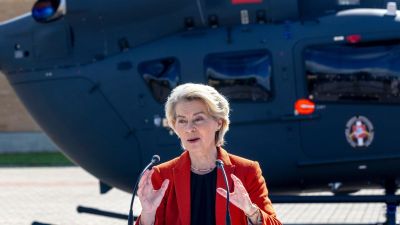The saffron undervest
Amidst the cacophony surrounding the election, a small item in the Press was denied the attention it deserved. A month or so ago 25 retired ...

Amidst the cacophony surrounding the election, a small item in the Press was denied the attention it deserved. A month or so ago 25 retired generals joined the BJP. One wonders what these worthies do after they join up. Were they actively campaigning for A. B. Vajpayee? Or perhaps relaxing at home dreaming of a governorship? They say that they advise the party on national security issues. In that case, the advice is well-known and can be summed up in one sentence. Give the armed forces back their izzat, increase the defence budget, go nuclear and institute a National Security Council.
But our principal concern is why so many of them join the BJP with so much fanfare. Sympathy for Hindutva is far more widespread amongst senior officers than was suspected. One has reason to believe that under their immaculate uniforms a large number of our senior servicemen wear a saffron vest.
It is quite easy to spot them. They invariably start a conversation by stating that they are really secular at heart. They havenever believed in caste or creed. But one must be fair. Don8217;t you think we are pampering the minorities? And what about those Pandits gunned down in Jamp;K? Enough is enough. It was not always so. Originally, the services stood solidly behind the ruling party. The government mostly consisted of leaders who had been at the forefront of the Independence movement. The Opposition did not really exist. Every serviceman was full of goodwill and support for the Congress. The reasons for the recent change of loyalties are many.
Servicemen the world over are conservative, a result of their upbringing, job and environment. They vote Tory in Britain and Republican in the US. They love law and order. Discipline, hard work, patriotism and family values8217; are the virtues that they admire and expect of others. They look for simplistic solutions to every complex problem. The preferred solution to the country8217;s present problems is what is fondly called 8220;a bit of danda8221;. And for some peculiar reasons the right-of-centreparties are supposed to possess all the virtues that a serviceman admires.
The general deterioration in the image of the Congress set the stage for a shift to the right. A major factor was the treatment meted out to servicemen by the ruling party, be it the Congress, Janata Dal or the United Front. In their messes, officers incessantly talk about the way Krishna Menon treated the service chiefs. Our countrymen may have forgotten the episode but every service officer knows about the shabby way in which Nehru treated General Thimayya. The hysterics in Parliament over some harmless remarks by Field Marshal Maneckshaw, the architect of our victory in 1971, are also well remembered. So is the public dressing-down of another Army Chief, General Rodrigues, by a defence minister in Parliament. Every serviceman is prepared to be loyal to the government but he expects as much loyalty in return. The day is long past when support could be taken for granted by throwing a few lollipops in the direction of servicemenafter their retirement.
In sharp contrast to the attitude of the Congress has been that of the BJP. It is the only party to actively woo retired senior officers. If there is one thing that a forgotten retired officer likes, it is an ego-massage.Except on military matters, he is unlikely to hold strong beliefs. They can be bent slightly to accommodate the proponents of Hindutva. Whatever their secretly held beliefs, outwardly the latter are sweet reasonableness. Of course we are not for a theocratic state. In fact, ours is true secularism. We are really nationalists. And of course the minorities will be treated fairly. We have no connection with the VHP or the RSS, which are only cultural organisations. Disillusioned with the fifty-year rule of the Congress and the Janata, the senior officer falls easy prey. He in turn will influence scores of others who look up to him for guidance and leadership.One of the more obvious reasons for the change has been our relationship with Pakistan. Since Independence thecountry has fought three wars with our neighbour. A fair number of servicemen have been killed or injured in these conflicts. Even to this day the militants, aided and abetted by Pakistan, cause the jawans to keep a constant vigil along the border in Jamp;K and Siachen.
To every serviceman Pakistan has been, is and will be our principal adversary. It is natural for him to bear an antipathy to every Pakistani and by extension to every member of the minority community in India. Despite the fact that not a single case of sabotage or disloyalty occurred during the three wars, every member of the community will always be suspect.
Such a mindset is fertile ground for rightist propaganda. India, of course, is not the first country to suffer from this syndrome. Even a liberal and literate country like the US disgraced itself by interning its entire Japanese American population in World War II. A major factor for the sympathy wave is the 8220;Mussolini made the trains run on time8221; syndrome. Like every sensible citizen,the serviceman too has watched with distaste the general decline in discipline and efficiency in the country. In service messes they talk nostalgically about the Emergency, when the office staff in South Block came to work on time. They recall the late sixties when a Jan Sangh government 8220;straightened out New Delhi.8221;
Servicemen have little patience with the slow and ponderous ways of democracy. To them the ends justify the means. What this country really needs is a good kick in the backside and the BJP is the only party who can give it, though their performance in the states has not been spectacular.The final argument trotted out is the 8220;give them a chance8221; plea. Surely the BJP can8217;t do worse than its predecessors. In fact, with their disciplined cadres they might do a whole lot better. They will certainly be good for the defence forces. For many servicemen that clinches the argument.
What is of particular concern is the potentially influential army of ex-servicemen. The leadership of this 3million-strong community is fractured and faction-ridden. Their legitimate demands for one rank, one pension8217; have been stalled. Successive pay commissions have done little to help. Respected in their villages and small towns, they can be potentially quite useful to the right. Spending a bit of time on them at present might be wise.
The present situation should have caused the Congress to sit up and take notice. But having taken the serviceman for granted for fifty years it is unlikely to make amends. The ethos of indifference and neglect is likely to continue.
The writer is a former chief of the Indian Navy
- 01
- 02
- 03
- 04
- 05































